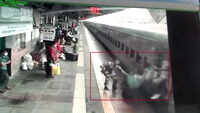
Gurgaon: Haryana police and the state drug controller on Tuesday busted two international drug smuggling rackets, both linked to each other, operating from residential houses in Gurgaon and recovered 63 different kinds of medicines, including Remdesivir and Lopinavir that are used for treating Covid-19 patients, besides several for cancer, depression and epilepsy.
Five foreign nationals, including four Iraqi nationals and a woman from Uzbekistan, were arrested. All of them had been staying in India without valid documents such as a passport or a visa. The four Iraqi nationals were working as translators with three prominent hospitals in the city.
Two separate FIRs have been registered against the five accused under sections of the Drugs and Cosmetics Act and the NDPS Act at the Sector 40 and Sector 56 police stations. The accused were produced before the court and taken into police custody for further investigation.
Police recovered a total of Rs 75 lakh in cash and a luxury vehicle during the two raids. The accused had stocked large quantities of medicines worth Rs 45 lakh in India (MRP price), which were supposed to be dispatched to Iraq on July 31 and sold there for Rs 3 crores (in Indian currency).
Investigators said the accused may have been involved in smuggling of medicines since some time, but the scale of operations had increased manifold due to scarcity of medicines in Iraq during the pandemic, during which people were ready to shell out more for the drugs.
DSP (CID) Inderjeet Yadav said the first raid was conducted at Aloha Gurgaon Group Housing in Sector 57 while the second took place at house no. 478/P in Sector 47. During the first raid, two Iraqi nationals, Aws Raad Nealmah Al-Hendi and Akram Faiz, were arrested and drugs, including cancer medicines, worth Rs 30 lakhs and Rs 35 lakhs in cash were found. The men did not have any receipt, licence or any other document related to the drugs.
In the second operation, two Iraqi nationals, Mohnaad and Othamana A Aeed, and a woman from Uzbekistan, Nilu Far, were arrested. Large quantities of medicines used in the treatment of Covid-19 — Remdesivir (48 vials), Fabiflu (55 strips) and Lopikast (18 packs) — along with antibiotics, antacids, anti-allergic, antipyretic and other drugs for cancer and HIV, were recovered from them, said Amandeep Chauhan, drugs control officer, Gurgaon.
“The drugs include medicines used for treatment of Covid patients and were being illegally exported from India. These medicines are in short supply,” said Yadav.
There was a white Fortuner (HR26DP7770) parked outside the house. When Mohnaad was asked to produce its keys, he refused, after which police broke open the vehicle’s quarter panel and recovered Fabiflu 50x1x34, along with Rs 8.91 lakhs in cash. Another Rs 30.14 lakhs in cash was found in one of the almirahs in the house. Drugs, including narcotic and psychotropic substances, were seized – 7,160 ampoules of phenobarbital sod, an injection containing 1,432 gm of phenobarbitone and 1,200 strips of lobazam 10.
ACP (Sadar) Aman Yadav said two of the Iraqi nationals, Akram Faiz and Aws Raad, had come to India on student visas in 2013 to study in Pune. However, they stayed on even after expiry of their documents and in 2016, they shifted to Gurgaon. They currently have refugee cards from the UNO. The other two Iraqi men, Mohnaad and Othamana, had come to India in 2017 as students too and continued living with documents. The woman from Uzbekistan had come to India in January this year and told police she got stuck due to the pandemic and suspension of international flights. The ACP added that police had sought details from the embassies about the five people.
Explaining how the racket worked, police said after the accused had taken up jobs as translators for patients coming from Iraq and had access to details of Iraqi nationals in Delhi-NCR for treatment. The translators also acted as local guides for the patients and had access to their travel plans.
“They used to broker a deal with these patients returning to Iraq and give them packets to take back. In Iraq, gang members used to collect these packets from the patients at the airport,” DSP (CID) Jitender Yadav said.
Thus, patients and their attendants coming to Delhi-NCR for treatment became couriers. As they were allowed to carry back medicines with a doctor’s prescription, they managed to clear customs easily enough, Yadav added.
“It is not clear whether the patients were aware about the smuggling or if they did it just as a favour to the accused,” said a police officer.
Five foreign nationals, including four Iraqi nationals and a woman from Uzbekistan, were arrested. All of them had been staying in India without valid documents such as a passport or a visa. The four Iraqi nationals were working as translators with three prominent hospitals in the city.
Two separate FIRs have been registered against the five accused under sections of the Drugs and Cosmetics Act and the NDPS Act at the Sector 40 and Sector 56 police stations. The accused were produced before the court and taken into police custody for further investigation.
Police recovered a total of Rs 75 lakh in cash and a luxury vehicle during the two raids. The accused had stocked large quantities of medicines worth Rs 45 lakh in India (MRP price), which were supposed to be dispatched to Iraq on July 31 and sold there for Rs 3 crores (in Indian currency).
Investigators said the accused may have been involved in smuggling of medicines since some time, but the scale of operations had increased manifold due to scarcity of medicines in Iraq during the pandemic, during which people were ready to shell out more for the drugs.
DSP (CID) Inderjeet Yadav said the first raid was conducted at Aloha Gurgaon Group Housing in Sector 57 while the second took place at house no. 478/P in Sector 47. During the first raid, two Iraqi nationals, Aws Raad Nealmah Al-Hendi and Akram Faiz, were arrested and drugs, including cancer medicines, worth Rs 30 lakhs and Rs 35 lakhs in cash were found. The men did not have any receipt, licence or any other document related to the drugs.
In the second operation, two Iraqi nationals, Mohnaad and Othamana A Aeed, and a woman from Uzbekistan, Nilu Far, were arrested. Large quantities of medicines used in the treatment of Covid-19 — Remdesivir (48 vials), Fabiflu (55 strips) and Lopikast (18 packs) — along with antibiotics, antacids, anti-allergic, antipyretic and other drugs for cancer and HIV, were recovered from them, said Amandeep Chauhan, drugs control officer, Gurgaon.
“The drugs include medicines used for treatment of Covid patients and were being illegally exported from India. These medicines are in short supply,” said Yadav.
There was a white Fortuner (HR26DP7770) parked outside the house. When Mohnaad was asked to produce its keys, he refused, after which police broke open the vehicle’s quarter panel and recovered Fabiflu 50x1x34, along with Rs 8.91 lakhs in cash. Another Rs 30.14 lakhs in cash was found in one of the almirahs in the house. Drugs, including narcotic and psychotropic substances, were seized – 7,160 ampoules of phenobarbital sod, an injection containing 1,432 gm of phenobarbitone and 1,200 strips of lobazam 10.
ACP (Sadar) Aman Yadav said two of the Iraqi nationals, Akram Faiz and Aws Raad, had come to India on student visas in 2013 to study in Pune. However, they stayed on even after expiry of their documents and in 2016, they shifted to Gurgaon. They currently have refugee cards from the UNO. The other two Iraqi men, Mohnaad and Othamana, had come to India in 2017 as students too and continued living with documents. The woman from Uzbekistan had come to India in January this year and told police she got stuck due to the pandemic and suspension of international flights. The ACP added that police had sought details from the embassies about the five people.
Explaining how the racket worked, police said after the accused had taken up jobs as translators for patients coming from Iraq and had access to details of Iraqi nationals in Delhi-NCR for treatment. The translators also acted as local guides for the patients and had access to their travel plans.
“They used to broker a deal with these patients returning to Iraq and give them packets to take back. In Iraq, gang members used to collect these packets from the patients at the airport,” DSP (CID) Jitender Yadav said.
Thus, patients and their attendants coming to Delhi-NCR for treatment became couriers. As they were allowed to carry back medicines with a doctor’s prescription, they managed to clear customs easily enough, Yadav added.
“It is not clear whether the patients were aware about the smuggling or if they did it just as a favour to the accused,” said a police officer.

Coronavirus outbreak
Trending Topics
LATEST VIDEOS
City
 RPF personnel saves man who fell from a moving train
RPF personnel saves man who fell from a moving train  Intelligence agencies flag 'possible' Islamist terror strikes in Ayodhya on the day of Ram Mandir Bhumi Pujan
Intelligence agencies flag 'possible' Islamist terror strikes in Ayodhya on the day of Ram Mandir Bhumi Pujan  AIMIM chief Asaduddin Owaisi slams PM Narendra Modi's plans to attend Ram Temple bhumi pujan
AIMIM chief Asaduddin Owaisi slams PM Narendra Modi's plans to attend Ram Temple bhumi pujan  Armed men barge inside house in UP's Ghaziabad, misbehave with female members, take away valuables
Armed men barge inside house in UP's Ghaziabad, misbehave with female members, take away valuables
More from TOI
Navbharat Times
Featured Today in Travel
Quick Links
Kerala Coronavirus Helpline NumberHaryana Coronavirus Helpline NumberUP Coronavirus Helpline NumberBareilly NewsBhopal NewsCoronavirus in DelhiCoronavirus in HyderabadCoronavirus in IndiaCoronavirus symptomsCoronavirusRajasthan Coronavirus Helpline NumberAditya ThackerayShiv SenaFire in MumbaiAP Coronavirus Helpline NumberArvind KejriwalJammu Kashmir Coronavirus Helpline NumberSrinagar encounter
Get the app



